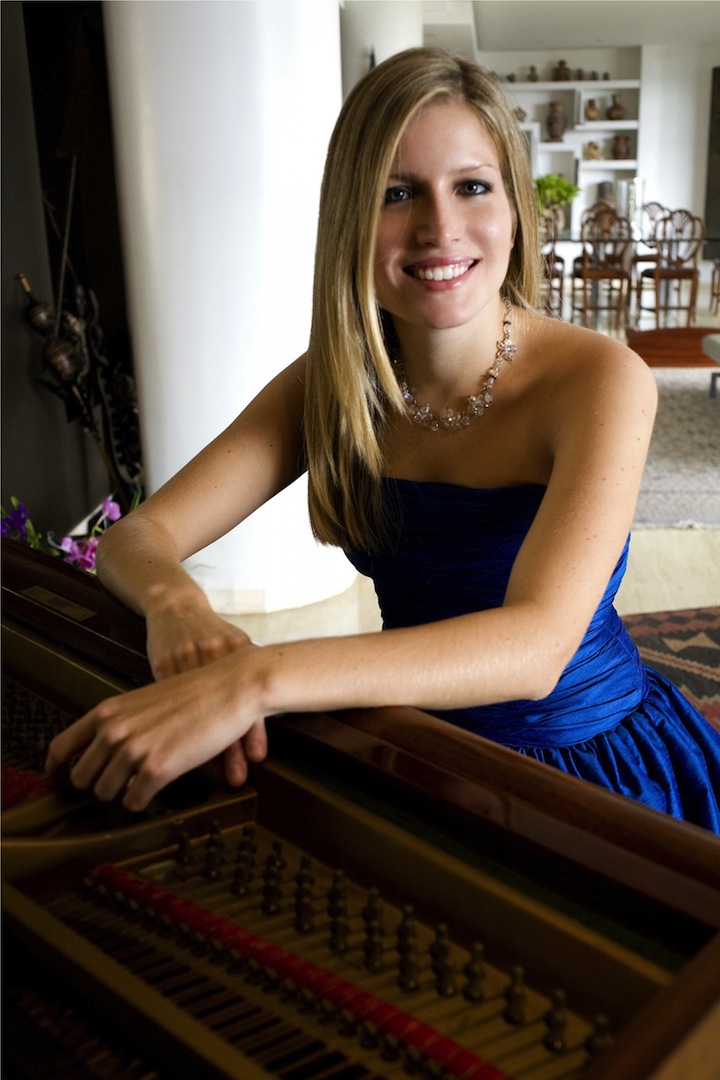
Five generations of women have played piano in Gabriela Martinez‘s family, but she calls herself a black sheep because, unlike the others, she didn’t earn another degree as professional backup.
- Classical Music 101: What Does A Conductor Do? - June 17, 2019
- Classical Music 101 | What Does Period Instrument Mean? - May 6, 2019
- CLASSICAL MUSIC 101 | What Does It Mean To Be In Tune? - April 23, 2019
The 28-year-old Venezuelan pianist makes her Toronto début as part of Roy Thomson Hall’s more intimate programming at the Glenn Gould Studio on Friday night.
The charming, lyrically minded pianist is presenting a fascinating programme that begins with Sergei Rachmaninov and ends with that pianist-composer’s Polish contemporary, Karol Szymanowski.
There are interesting detours in between.
Rachmaninov’s Moments Musicaux Nos 1 & 4 are followed by the Ballade by Samuel Barber, the Canadian premiere of Nocturne No. 1 by contemporary Belgian composer-conductor Dirk Brossé and the Op. 33 Bagatelles by Ludwig van Beethoven.
The Brossé piece came about at Martinez’s insistence. They had worked together as conductor and soloist. He had never created a piece for solo piano, so she kept bugging him about it until he wrote her a set of seven Nocturnes, which she premiered.
The second half of Friday’s recital opens with Franz Liszt’s Petrarch Sonnet No. 104 and segues to contemporary American composer Mason Bate’s White Lies for Lomax before ending with the B-flat Major Variations by Szymanowski.
“I really like short works for piano; I love to be able to tell a story in 6 minutes or 7 minutes and then compare it to something else,” says Martinez from her Upper West Side apartment in New York City. “I like the idea of including pieces that have a variation feel and flair to them.”
Martinez also gets inspired by music that has a back story or some sort of extra-musical connection, like the Liszt piece.
“The music is beautiful and lyrical and pretty, and then you read the sonnet and you’re, like, holy cow, this is really dark!” she laughs.
The pianist isn’t sure whether she’ll read the sonnet — about someone who hates the world because of a love affair gone wrong — at the recital, but she does believe in trying to speak a little bit about the music she performs.
She’ll probably say that the Ballade was Barber’s last work for piano, a commission from the Van Cliburn competition in 1977. She’s also likely to explain that the Bates piece is an homage to enthomusicologist Alan Lomax’s love of Delta blues.
“It’s very distant representations, but I’m always fascinated to see what composers do with different ideas,” says the pianist.
“As an audience member, when I go to a concert, I’m more inspired when I have a personal connection,” Martinez explains. “I pair these pieces for a reason, and I feel maybe it’s interesting for people to know more.”
She is conscious, though, that audiences come to hear her play — “what I do is piano, not speaking.”
Martinez was born into a long line of good amateur pianists. Her grandmother had a PhD in philosophy. Her mother, who has an architecture degree, straddled both worlds by giving piano lessons when Gabriela was growing up.
Despite piano lessons being available at home, Martinez recalls her mother had other ideas: “She really didn’t want me to be a musician and she especially didn’t want me to be a pianist. It’s a hard lifestyle.”
Instead, Martinez was handed a violin, which she hated to the point of daily tears.
“Eventually, my Mom caught me trying to play by ear,” she recalls. “Her students would leave and I would run to the piano. So finally she gave up.”
The piano lessons started at 5 1/2. By age 11, Martinez’s parents realised their daughter needed a better teacher, so the whole family moved to New Jersey so she could go to the Juilliard School’s pre-college division.
Although her family, including two brothers, moved back to Venezuela once she began studies at Juilliard proper, Gabriela stayed behind, and has lived in the United States ever since.
And she has never second-guessed her choice of career.
“I have no memory of a point of saying, oh this is what I want to do. I have always wanted to be a musician and known this is what I was going to do. It never occurred to me that there is anything else I could do or wanted to do. It’s me,” Martinez declares.
She has a doctorate and has done the competition circuit. Now she is working on the really hard part: Building a solid career.
In a lot of ways, that process is similar to putting together Friday’s programme. “It’s a long story told in short segments,” she says.
+++
For details on Friday’s recital, click here.
Here is a sample of Martinez at work, performing Rachmaninov’s Piano Concerto No. 3 with Gustavo Dudamel and the Simón Bolívar Youth Orchestra in Venezuela:
John Terauds
- Classical Music 101: What Does A Conductor Do? - June 17, 2019
- Classical Music 101 | What Does Period Instrument Mean? - May 6, 2019
- CLASSICAL MUSIC 101 | What Does It Mean To Be In Tune? - April 23, 2019



